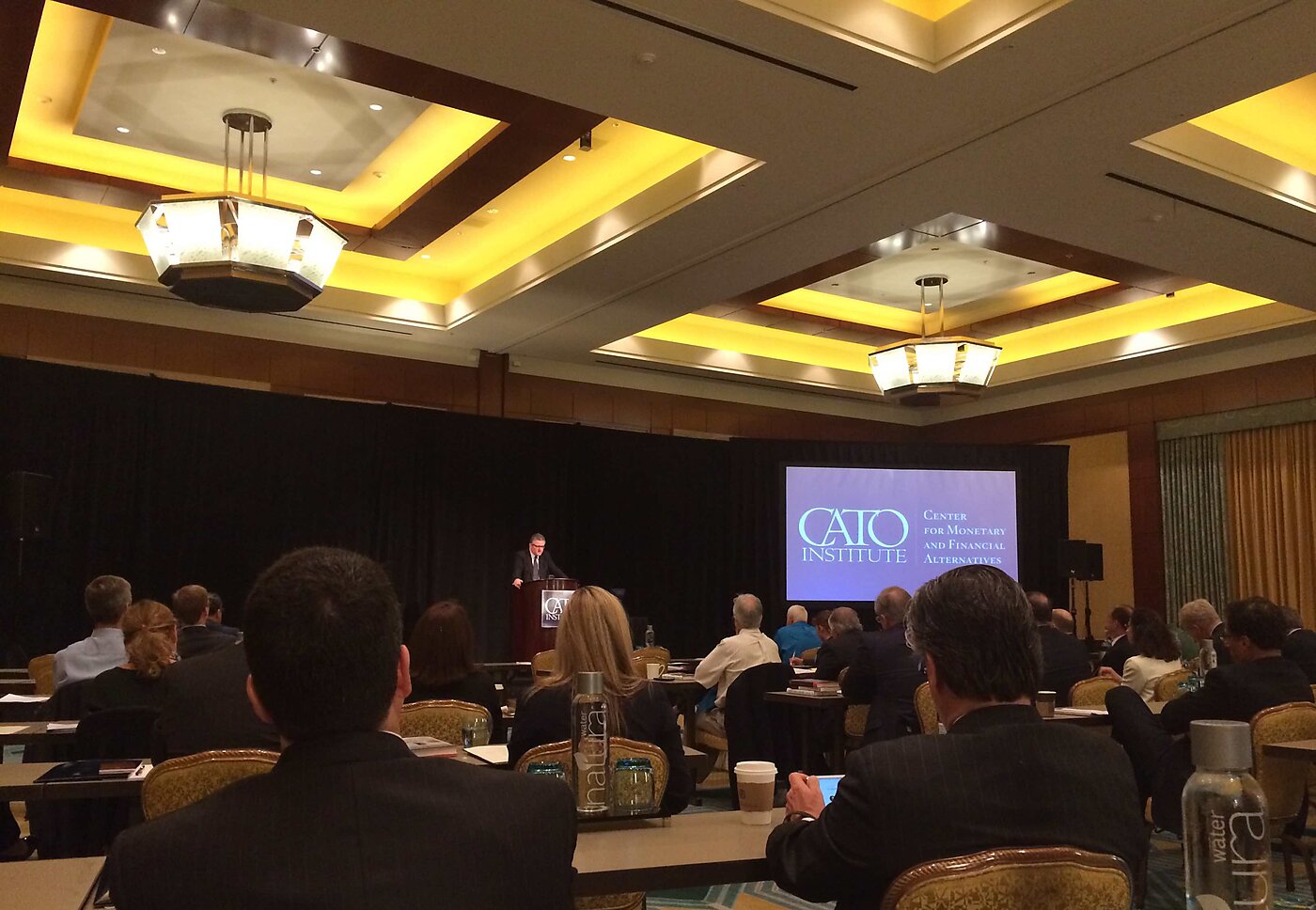Organized by CMFA’s Thaya Brook Knight, “Banking Unbound” explored banking regulation from the perspective of history, technology, the public, the administration, and a banker. You can download the full suite of speaker podcasts here. Keep reading for the synopsis.
Mark Calabria’s Keynote Address
Mark Calabria, the Vice President’s chief economist and formerly Cato’s director of financial regulation studies, kicked off the summit, providing an executive branch perspective on the current financial regulatory policy outlook. He spoke on the need to revitalize private regulation in the financial system and placed particular emphasis on ending too big to fail and bailouts. Highlighting the harm of bailouts, Calabria connected low productivity growth during the current expansion with the financial crisis bailouts that prevented the transfer of resources from less to more productive purposes.
George Selgin on A Tale of Two Banking Systems: How Government Regulation Undermines Stability
CMFA’s director George Selgin provided the historical perspective to the current policy debate by comparing the heavily regulated 19th century American banking system to its laissez-faire counterpart in the north: Canada. Back then, the American and Canadian economies held similar traits, yet the American banking system experienced many banking crises while the Canadian one did not. What was the difference?
A host of misguided government regulations plagued the American system, including branching restrictions, note issue restrictions, and some outright bans on banking. The sole purpose of one regulation, requiring federal government securities to back any bank note issue, was to aid the government’s fiscal position. The tragic consequence was frequent, panic-inducing currency shortages. By contrast, the Canadian system, largely left alone by government, with its nationwide system of branch banking and a supply of currency that automatically adjusted to cyclical fluctuations in the demand for money, suffered virtually no bank failures let alone panics.
Selgin discusses in-depth how misguided regulatory policy is at the root of persistent American financial instability in his new book, Money: Free and Unfree.
Brian Knight on Banking Regulation and Financial Technology
Mercatus Center senior research fellow Brian Knight looked to the future, considering how fintech (financial technology), and fintech companies like marketplace lenders, might disrupt traditional banks. He also reviewed the regulatory hurdles in their way.
In the U.S., banks are broadly preempted from state law: they can conduct business nationally while only having to comply with their home state’s rules. Non-bank fintech companies don’t enjoy the same regulatory relief. Online fintech lenders have attempted to overcome this state regulatory hurdle by partnering with banks. A bank extends the loan and quickly sells it to the fintech firm, which then is responsible for servicing the loan. In addition to the obvious inefficiencies arising from this model, state level regulators in Colorado have sued marketplace lenders, arguing that the workaround does not truly preempt fintech firms.
Given the current state of confusion, both state and federal regulators are investigating policy changes. One possibly promising outcome is a national fintech charter, proposed by the OCC, which would preempt fintech firms from state law. However, the current draft of rules would subject fintech firms to bank-like regulations, including capital requirements. Knight instead advocated a regulatory system based on freedom of contract among marketplace lending participants.
Knight frequently writes on fintech policy issues on the blog FinRegRag.
Emily Ekins on Public Perceptions of Banking and Finance
Emily Ekins, the director of polling at Cato, previewed results from a financial services public opinion poll she recently conducted for CMFA. A briefing paper that formally presents the results is forthcoming. For now, a few highlights.
While most Americans have negative views of Wall Street, a majority view the services Wall Street provides as important to the health of the economy. An overwhelming majority of Americans are happy with the financial services they themselves receive. About 72% of Americans do not think that Dodd-Frank will reduce the chance of a future financial crisis. Ekins also shared some topline numbers on the public’s opinion of financial regulators, a largely unexplored topic in public opinion polls.
Kelly S. King’s Lunch Address
BB&T’s chairman and CEO, Kelly King, closed out the day’s proceedings, sharing broad thoughts about the state of banking regulation from the receiving end as a banker.
King explained how the post-crisis regulatory regime hurt both banks and consumers. New regulations have forced banks to devote an ever greater amount of energy to compliance. Less time is spent holistically evaluating credit risk, which weakens banks’ financial health while also hurting consumers in the market for a loan. Moreover, the regulations themselves don’t advance the causes of consumer protection or systemic risk reduction. King gave the example of the CFPB’s mortgage servicing rules, which require banks to provide consumers with about 600 pages of documents to review. Such copious amounts of paperwork fatigue consumers rather than helping them understand their mortgage and draw out the mortgage process. And the supposed “protection” from the extra paperwork doesn’t help banks evaluate the riskiness of the mortgage loan.
King noted the CHOICE Act — which would return a great deal of freedom to properly capitalized banks — as a welcome departure from overly burdensome regulation that would promote safety and soundness in the banking system.


